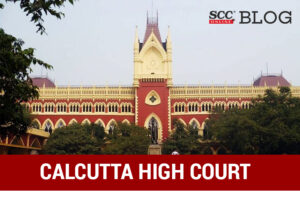Calcutta High Court | While deciding an application filed under S. 14 of the Arbitration and Conciliation Act, 1996 (the Act), for termination of the mandate of the Sole Arbitrator, Moushumi Bhattacharya*, J. held that the de jure or de facto termination of mandate of an arbitrator under S. 14 of the Act must not only be assessed in light of the proviso to S. 12(5) but also with reference to the express agreement entered into between the parties or any wavier by the parties subsequent to the dispute having arisen between the parties.
Factual Matrix
In the instant matter, a dispute between the petitioners and the respondents arises out of an Agreement for Arbitration made on 24-03-2018. An arbitrator was appointed under clause 3 of the Agreement for Arbitration. The petitioners preferred an application under S. 14 of the Act before this Court for termination of the mandate of the Sole Arbitrator and stay of all further proceedings in the arbitration pending disposal of the present application.
Parties’ Contentions
The petitioners contended that the appointment with regards to the unilateral appointment of the Arbitrator by one of the parties to the dispute is invalid as the petitioners did not execute any express agreement in writing to circumvent the invalidity of the appointment. Moreover, the petitioners cited at least two instances reflecting the bias of the appointed Arbitrator.
The respondents contended that the Arbitrator is not struck by the disability contemplated in S. 12(5) as the petitioners were aware of the disclosure made by the Arbitrator and the petitioners knowingly and willingly participated in the Arbitration proceeding before the Arbitrator. Moreover, the pleadings and affidavits filed by the petitioners amount to an express written agreement under the proviso to S. 12(5) of the Act. The respondents further contended that the present application is only filed with the intention to wriggle out of the consent orders obtained by the petitioners on the basis of statements made in its affidavit/Statement of Defence.
Moot Point
Whether the Arbitrator has become de jure or de facto unable to perform his functions by reason of the statutory bar under S. 12(5) of the Act?
Court’s Verdict
The Court observed that the pleadings filed by the petitioners before the Arbitrator constitute an express agreement as required under the proviso to S. 12(5) of the Act. Moreover, the exchange of Statement of Claim and Statement of Defence/affidavit in the present proceeding by the petitioner and respondent no. 1 respectively fulfils the requirement of S. 7(2)(e) of the Act which provided that the existence of an arbitration agreement in case it is alleged by one party and not denied by the other by way of exchange of statements of claim and defence.
The Court observed that “the express agreement of the parties to get around the disqualification under the categories mentioned in section 12(5) can only be in relation to the Seventh Schedule” and from the facts of the case and material placed on record it is clear that the Arbitrator appointed in the present case does not fall under any of the prohibited relationships/categories in the Seventh Schedule including Entry 12 which applies when the arbitrator himself is a manager, director or part of the management or has a similar controlling influence in one of the parties.
The Court further observed that the Arbitrator appointed in the present case is a retired Judge of the Madhya Pradesh High Court and the alleged ineligibility of the appointment is regularised under the proviso to S. 12(5) by the express written documents executed by the petitioners and their continuous participation in the arbitration.
The Court held that disqualification of arbitrator under the Act must not only be assessed in light of the proviso to S. 12(5) and the Seventh Schedule but also with reference to the waiver of any such disqualification by express agreement entered into between the parties or their conduct after the dispute having arisen between the parties.
“…section 12(5) is not applicable to this case since the alleged disqualification does not breach any one or more of the conflict-protections in the Entries of the Seventh Schedule. Even if it is assumed that the Arbitrator became ineligible by reason of the Seventh Schedule, the petitioners waived such disqualification by their express writings, conduct and agreement as envisaged under the proviso to section 12(5) of the Act.”
The Court, while dismissing the arbitration petition, held that no material exists in the present petition disclosing the termination of mandate for the Arbitrator.
[McLeod Russel India Ltd. v. Aditya Birla Finance Ltd., 2023 SCC OnLine Cal 330, order dated 14-02-2023]
*Judgment by Justice Moushumi Bhattacharya.
Advocates who appeared in this case :
Mr. Abhrajit Mitra, Mr. Jishnu Chowdhury, Mr. Rajarshi Dutta, Mr. Chayan Gupta, Mr. Reetoban Sarkar, Mr. Prasun Mukherjee and Mr. Deepak Agarwal, Counsel for the Petitioners;
Dr. Abhishek Manu Singhvi, Mr. Ranjan Bachawat, Mr. Sanjeev Kumar, Mr. Rohit Das, Mr. Dwaipayan Basu Mullick, Ms. Suchismita Ghosh Chatterjee, Mr. Abhishek Kisku, Mr. Pranshu Paul, Mr. Anshul Sehgal, Mr. Subhankar Das and Mr. Nidhi Ram, Counsel for the Respondents.

